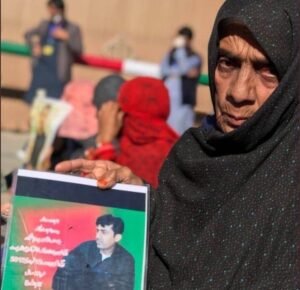Crimes Against Humanity of Gender Persecution: The Taliban’s Violation of Human Rights in Afghanistan

A group of Afghan women walk in support of Taliban in downtown Kabul in August to celebrate Taliban's victory. Photo: @AADIL
By SS Ahmad
Human rights violations, especially against women and girls, escalated after the Taliban took control of Afghanistan in August 2021. The current article is a summary of the report released by Human Rights Watch (HRW) on the Crimes Against Humanity of Gender Persecution committed by the Taliban regime in Afghanistan. It examines the international law’s consequences for crimes against humanity, the definition of gender persecution, and the legal framework underlying these concepts.
Crimes Against Humanity: A Legal Perspective
As a result of their extreme brutality and scale, crimes against humanity shock the collective human conscience. The international community is outraged by the atrocities implemented by the Taliban, which were originally defined in the statute of the Nuremberg International Military Tribunal in 1945. The Rome Statute of the International Criminal Court (ICC) defines a range of prohibited acts as crimes against humanity when committed as part of a widespread or systematic attack against any civilian population, even though there is no specific international convention solely dedicated to crimes against humanity.
The report defines the crime of persecution as: “the intentional and severe deprivation of fundamental rights contrary to international law by reason of the identity of the group or collectivity,” based on “political, racial, national, ethnic, cultural, religious, gender … or other grounds that are universally recognized as impermissible under international law.”
The ICC’s “Policy on the Crime of Gender Persecution” (2022) states that “gender persecution is committed against persons because of sex characteristics and/or because of the social constructs and criteria used to define gender.”
Rights violations and other forms of persecution against women and girls in Afghanistan include according to HRW, restrictions on their freedom of movement, expression, association, employment, dress, and education as well as arbitrary arrests and violations of their right to liberty.
The report states that the Taliban’s treatment of women and girls meets all four requirements for crimes against humanity under the Rome Statute: 1) the attack is “widespread or systematic,” 2) the attack is directed against a “civilian population,” 3) the acts are committed “with knowledge of the attack,” and 4) the acts are “pursuant to or in furtherance of a State or organizational policy to commit such attack.” Given the scope and persistence of the Taliban’s human rights violations in Afghanistan, it is clear that their actions fall within the definition of crimes against humanity.
Gender Persecution as a Crime Against Humanity
Persecution based on gender is one of the Taliban’s most horrific practices and may constitute a crime against humanity. Persecution based on a person’s gender is a breach of international law since it includes the deliberate and serious impairment of fundamental rights. The “Policy on the Crime of Gender Persecution” issued by the International Criminal Court makes clear that victims of this form of persecution are singled out because of their gender.
The Taliban’s use of gender-based offenses as a tool to control and punish anyone they consider to be violating conventional gender norms in Afghanistan is well-documented. This stifling of individual agency permeates every facet of life, from the ability to travel freely and the right to procreate to marriage and clothing regulations and even the right to exist.
Forced marriages and sexual assaults against girls and women are two examples of such crimes. These deeds are used as instruments of social control and discrimination on the basis of gender identification. Gender persecution is a prime example of how the Taliban’s discriminatory rules undermine basic human freedoms.
The Taliban’s Human Rights Violations: Pursuing Accountability
Those responsible for these horrors can be brought to justice through the criminal justice system. Those who direct, coordinate, prepare for, allow, or acquiesce in the conduct of a crime share responsibility for its commission with those who commit it. Officials, both civilian and military, are held accountable for the activities of their subordinates if they knew, or should have known, about the crime and did nothing to stop it.
The Taliban’s treatment of women in Afghanistan is a particularly heinous violation of human rights. These atrocities must be recognized and condemned on a global scale. Those involved, including those in positions of authority, must be held accountable for their actions if justice and prevention are to be achieved. It is critical that international organizations, legal authorities, and governments collaborate to protect the rights of women and girls in Afghanistan and bring an end to the country’s protracted conflict since women and girls continue to suffer under the brutal leadership of the Taliban.
SS Ahmad is a freelance researcher and journalist based in Afghanistan.
Note: The contents of the article are of sole responsibility of the author. Afghan Diaspora Network will not be responsible for any inaccurate or incorrect statement in the articles.











